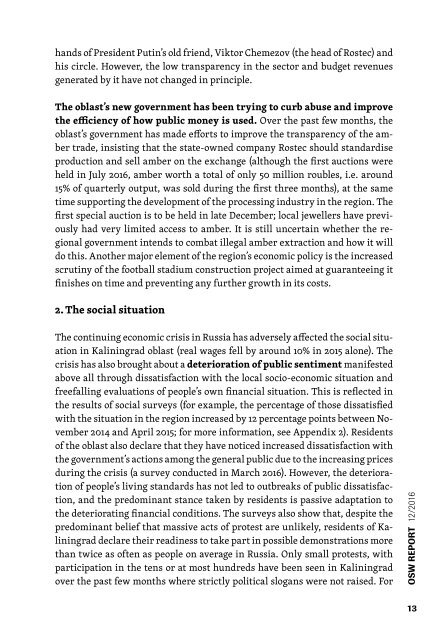Kaliningrad Oblast 2016
raport_in_the_kaliningrad_net
raport_in_the_kaliningrad_net
Create successful ePaper yourself
Turn your PDF publications into a flip-book with our unique Google optimized e-Paper software.
hands of President Putin’s old friend, Viktor Chemezov (the head of Rostec) and<br />
his circle. However, the low transparency in the sector and budget revenues<br />
generated by it have not changed in principle.<br />
The oblast’s new government has been trying to curb abuse and improve<br />
the efficiency of how public money is used. Over the past few months, the<br />
oblast’s government has made efforts to improve the transparency of the amber<br />
trade, insisting that the state-owned company Rostec should standardise<br />
production and sell amber on the exchange (although the first auctions were<br />
held in July <strong>2016</strong>, amber worth a total of only 50 million roubles, i.e. around<br />
15% of quarterly output, was sold during the first three months), at the same<br />
time supporting the development of the processing industry in the region. The<br />
first special auction is to be held in late December; local jewellers have previously<br />
had very limited access to amber. It is still uncertain whether the regional<br />
government intends to combat illegal amber extraction and how it will<br />
do this. Another major element of the region’s economic policy is the increased<br />
scrutiny of the football stadium construction project aimed at guaranteeing it<br />
finishes on time and preventing any further growth in its costs.<br />
2. The social situation<br />
The continuing economic crisis in Russia has adversely affected the social situation<br />
in <strong>Kaliningrad</strong> oblast (real wages fell by around 10% in 2015 alone). The<br />
crisis has also brought about a deterioration of public sentiment manifested<br />
above all through dissatisfaction with the local socio-economic situation and<br />
freefalling evaluations of people’s own financial situation. This is reflected in<br />
the results of social surveys (for example, the percentage of those dissatisfied<br />
with the situation in the region increased by 12 percentage points between November<br />
2014 and April 2015; for more information, see Appendix 2). Residents<br />
of the oblast also declare that they have noticed increased dissatisfaction with<br />
the government’s actions among the general public due to the increasing prices<br />
during the crisis (a survey conducted in March <strong>2016</strong>). However, the deterioration<br />
of people’s living standards has not led to outbreaks of public dissatisfaction,<br />
and the predominant stance taken by residents is passive adaptation to<br />
the deteriorating financial conditions. The surveys also show that, despite the<br />
predominant belief that massive acts of protest are unlikely, residents of <strong>Kaliningrad</strong><br />
declare their readiness to take part in possible demonstrations more<br />
than twice as often as people on average in Russia. Only small protests, with<br />
participation in the tens or at most hundreds have been seen in <strong>Kaliningrad</strong><br />
over the past few months where strictly political slogans were not raised. For<br />
PRACE OSW REPORT OSW 09/2012 12/<strong>2016</strong><br />
13


